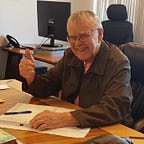Us Ordinary Folk
Excerpts from Arthur Thormann’s book called Us Ordinary Folk
Preface
Ordinary folk often fail to understand what’s happening on the world scene and even closer to home. We ordinary folk depend for our understanding on what bigwigs decide we should know and on the media, even though the media may put their own spin on the so-called news. This leads to speculations and misunderstandings. The reluctance of bigwigs to be open is often understandable, and the dramatization of the news by the media is also understandable, but it forces us to make up our own minds to know what is happening and what is true.
Regardless how twisted the media may present us with the news, I for one value our media. The reason is that I experienced a state-controlled media in my early life, and with that sort of media we are often purposely misled. Our free-world media may put their own spin on the news, but they seldom purposely tell us lies!
We are well aware of what famous people have done to become famous, and my aim for this book was to interview some of us ordinary folk to find out what they do and believe, and how they fulfill their purpose in life.
Also, I wanted to explore a bit about the purpose of human life. Let me start by telling you my belief: I think the purpose of human life is to advance the human race. Whether you have attained fame or are just one of us ordinary folk, the purpose is the same, although we may not realize it.
Let me illustrate this point by a brick building: The bricks, akin to famous people, are very visible, but the mortars, akin to us ordinary folk, are very necessary to hold the bricks together. Both, the bricks and the mortars form a strong building, akin to an advanced human race.
The advancement of the human race aims at a more harmonious life, as our fellow on the front cover of this book has already attained.
The fellow on the front cover is obviously oblivious to what’s happening around him, especially world events, not because he doesn’t care about them, but because he gave up speculating on them. So, since he is one of us ordinary folk, perhaps we can try to inspire him to take notice with a few of our own speculations.
All of the chapters aim to address aspects of human life that are everyday concerns of us ordinary folk, and the appendix aims to inspire millionaires to do their part to advance the human race.
Arthur O.R. Thormann
May 2018
Appendix: The Millionaires’ Club
I have had another dream: this one about a millionaires’ club. The club had no members but only patrons who were willing to make donations. The specified donations consisted of $100,000, $500,000, or $1,000,000. The club owned a building for the purpose of donation administration and disbursements, and to cook and serve steaks to patrons.
When a patron entered the building, he or she would stop at a table in the lobby and pick up a glass with a lit candle in it. A small glass would be for a $100,000 donation, a medium-sized glass for a $500,000 donation, and a larger glass for a $1,000,000 donation. The patron would then proceed to the dining room.
In the dining room, the patron would pick a table and place the glass on the table. A server would come and take the steak order. The steaks offered were New York strips, filet mignons, rib eyes, and T-bone, with a baked potato. Patrons could also request a salad with their choice of dressing, and French bread with pads of butter. Bottled Fiji water was served without ice, but patrons could request ice produced from Fiji water. A light beer (3% alcohol) especially brewed for the club was available upon request, but wine or stronger spirits were not available. Various steak sauces were also available upon request. All steaks were of high-quality beef, and were fried over charcoal on an open hearth in the dining room, and when served to the patron the server would remove the glass with the candle, request a signed chit for the donation, and issue a receipt for tax purposes.
The mission of the club was to keep the human race alive as much as possible. The Club would use the donations to send CARE Packages anywhere in the world where famine persevered.
